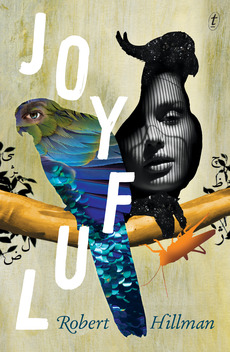Do you remember the cartoons on TV when you were a child? In those surreal tales, Scooby-Doo, Tom, Jerry, or Roadrunner would sometimes be hit by a cannonball. It passed through their bodies, leaving only a neat circular hole which they looked at in comic dismay.
That’s how grief feels. A great hole punched through your body – through your life – that makes you want to curl up on the ground, weeping and whispering the lost one’s name. Nobody said it would be dignified. We don’t pass through neat stages of grief either, as was once thought, but – at best – we somehow learn to live with it, in time.
Robert Hillman’s new novel, Joyful (Text Publishing) explores this terrain of love and loss with a characteristic blend of lightness and dark enquiry. Antiquarian bookseller, Leon Joyce, mourns the early death of his wife, Tess. Leon is no ordinary man, however, nor is their relationship conventional. Leon is, he tells us, quite uninterested in sex. Tess, on the other hand, is enthusiastically promiscuous. They come to an arrangement. One day a week she can do as she wishes with no questions asked.
When Tess dies, Leon discovers that she had a secret, slavish passion for a bear-like Polish poet, Daniel. She had installed Daniel in one of Leon’s country properties and visited him every Sunday. Driven almost mad with grief, Leon sets off to Yackandandah, to repossess the house, and to jealously reclaim her memory – to restore the beautiful, perfect Tess he remembered.
Tragedy and comedy are finely and sensitively balanced in the story of Leon and the people he encounters. There are a number of sub-plots which echo the despairing extravagance of Leon’s sorrow. The most moving and memorable of these concerns Professor Delli who is also driven mad by grief for a while following the death of both his children. Delli empties his house onto the street and ends up standing naked in the rain by a country road, like Lear on ‘the blasted heath’. He threatens to kill his wife, Daanya, and calls her by new obscenities every day. Daanya only responds with understanding and love, stroking his arm and saying gently, ‘poor Delli’ until he finally recovers.
In contrast, Leon tries to literally ‘buy’ others’ memories of Tess, so that only his own are left. He almost destroys the house, carving letters to her into every wooden surface of the house until it is covered, then attempting to set it on fire. Finally realising he can never regain the idealised Tess, he abruptly proposes to Susie, the assistant in his bookshop, who agrees to move in with him.
This is no romantic, healing conclusion. Leon is a monster of self-pity. After losing Tess, kept like a beautiful mannequin as the object of his obsession, he finally releases her memory only to attach his needy tentacles to poor Susie who feels sorry for him. Iris Murdoch defined love as ‘the extremely difficult realisation that someone other than yourself is real’. To love, then, is to realise and cherish that other existence in itself, with no reference to oneself. This is a discovery that the repellant Leon ultimately fails to make, remaining a prisoner to his own obsessive needs. In her own gaily promiscuous way, Tess was actually more faithful to him.
It must be said that the novel is sometimes tangled by levels of detail which ‘over egg’ the story: for example, the academic researcher who conveniently appears on Leon’s doorstep with the sole function of leaving copies of his great-aunt’s diary behind, which carries another echoing sub-plot. Overall, though, Joyful is an idiosyncratic and imaginative novel which will move anyone who reads it .




